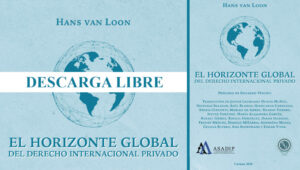Views
Nothing Found
Sorry, no posts matched your criteria
News
ASADIP – Its annual conference has been rescheduled and recent activities
The American Association of Private International Law (ASADIP) has postponed its annual conference to a later date in 2021, given the current pandemic. The 2021 conference is entitled “Private International Law and Modern Technologies” and will be held on 4-5 November 2021 in Washington DC (USA). The venues of the conference will be Georgetown University and the Organization of American States (OAS). Blockchain technology and its interrelation with PIL features prominently in the general topics to be discussed. For more information, click here.

As regards recent activities, ASADIP has proudly announced the translation into Spanish of the article of Hans van Loon, former Secretary General of the HCCH, entitled “The Global Horizon of Private International Law: Inaugural Lecture” delivered during the Hague Academy’s Private International Law Session of 2015 (published in Recueil des cours Vol. 380, Pages 9-108, apparently only available in book form). The Spanish translation of Hans van Loon’s article is “El horizonte global del Derecho internacional privado” and is fully available here.

PAX Moot semi-finals and finals online on Friday 29 May
The Pax Moot went totally online this year (OK, no surprises there). The case concerns an employment dispute and environmental damage due to mining in an unidentified African country (see the paxmoot website). It raises various issues of jurisdiction, applicable law, freezing orders, parallel proceedings and company structures.
Over the past two days the preliminary rounds took place on an online platform hosted by the University of Antwerp. The Universities of Cologne, Erasmus Rotterdam, Maastricht and Singapore Management University secured places in the semi-finals.
Please join us on 29 May at the links below for the semi-finals and finals. All welcome!
Semi-finals 1, 10.00 – 11.30 CEST: https://eu.bbcollab.com/guest/4a86f539e78642859e773e301ddbb8dd
University of Cologne v. Erasmus University Rotterdam
Judges: Ilse COUWENBERG, Daniel GIRSBERGER and Matthias WELLER
Semi-finals 2, 10.00 – 11.30 CEST: https://eu.bbcollab.com/guest/2d4c41243bf44fdbb3c175b15d0f30cf
Singapore Management University v. Maastricht University
Judges: Hans VAN HOUTTE, María ALVÁREZ TORNÉ and Michael WILDERSPIN
Finals, 13:30-15:00: https://eu.bbcollab.com/guest/b85996765dce4a4db29ad03e4a9b235f
13:30 Welcome words, by Frederik SWENNEN, Dean of the Law Faculty, University of Antwerp
Pleadings
Judges: Horatia MUIR WATT, Alex LAYTON, Hans VAN LOON
Approx. 15:30 Awards and Closing Ceremony
- A few words about the Case, by Alexander LAYTON QC
- A few words on behalf of the European Commission, DG Justice, Civil Unit, by Pia LINDHOLM
- Official results of the 2020 Rounds:
- Best written submissions, by Horatia MUIR WATT, Competition Initiator and Member of the PAX Team
- Best oralist, by Daniel CHAN, Executive Secretary of the PAX Team
- Winner of the 2020 Asser Round, PAX Competition, by Horatia MUIR WATT
- Farewell words, by Hans van LOON
The Moot Court Competition is organised by the University of Antwerp and the T.M.C. Asser Instituut, as part of the research project on ‘Regulation BIa: a standard for free circulation of judgments and mutual trust in the EU (JUDGTRUST)’, funded by the European Union, DG Justice (JUST-JCOO-AG-2017), in cooperation with Sciences Po Law School.
Virtual Workshop Series at the Max Planck Institute in Hamburg
The Max Planck Institute for Comparative and International Private Law in Hamburg is starting a new virtual workshop series in private international law. The first speaker, Matthias Lehmann from Bonn University, will present (in German) on Tuesday, June 2, at 11:00-12:30 via zoom. His topic: Covid-19 and Private International Law (see also here and here). Open to everyone, including doctoral and predoctoral students!
More information (in German) and the link for signing up are here.


